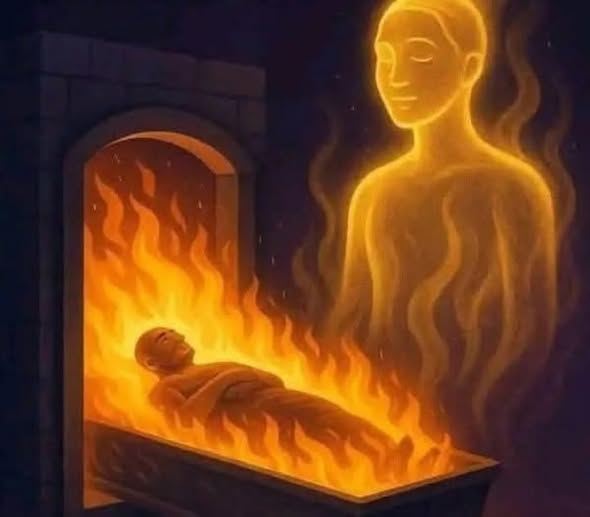THE SIN OF CREMATION according to the Bible says…
The question of cremation is not new, yet in our modern world it has become increasingly common as people seek convenience, cost efficiency, or cultural conformity rather than biblical conviction. But what does the Word of God truly say about the burning of the human body after death? Is cremation an acceptable practice in the sight of the Lord, or is it an act that dishonors the sacredness of the body God has made? To understand this deeply, we must turn to the Scriptures.
From the beginning, the Bible shows that God places great honor upon the human body, for it is not a mere shell, but a vessel created in the image of God Himself (Genesis 1:27). The Lord formed man from the dust of the ground and breathed into his nostrils the breath of life (Genesis 2:7). This act of divine creation shows that our bodies are not worthless matter but living temples designed for the indwelling of God’s Spirit (1 Corinthians 6:19–20). Therefore, the way we treat the body, even in death, reflects our view of God’s creation and His promise of resurrection.
Throughout the Old Testament, God’s people consistently practiced burial, not burning. Abraham purchased the cave of Machpelah to bury Sarah (Genesis 23:19). Later, Abraham himself, Isaac, Jacob, and Joseph were buried in hope of the resurrection and God’s eternal promises (Genesis 49:29–33; Exodus 13:19). When Moses died, God Himself buried him in the land of Moab (Deuteronomy 34:5–6). If cremation were acceptable or holy, surely the Lord would have shown us an example of it among His faithful servants—but there is none.
By contrast, the burning of human bodies is shown in Scripture as a sign of judgment or curse. In Joshua 7:25, Achan, who sinned against the Lord, was stoned and then burned as a symbol of divine wrath. In 1 Samuel 31:12, the men of Jabesh-Gilead burned the bodies of Saul and his sons, but many scholars believe this was due to necessity—perhaps because their bodies were mutilated by enemies—not as a model for God’s people. In Amos 2:1, the Lord condemned the Moabites “because he burned the bones of the king of Edom into lime.” The act of burning the dead was thus seen as an offense against human dignity and divine order.
The New Testament continues this reverence for the body. Jesus Christ Himself was buried, not cremated. His body was wrapped, anointed, and laid in a tomb, fulfilling prophecy (John 19:38–42). The burial of Christ is central to the gospel message—Paul says in 1 Corinthians 15:4 that “He was buried, and He rose again the third day according to the Scriptures.” Burial symbolizes faith in the resurrection: the body is sown in corruption, but it is raised in incorruption (1 Corinthians 15:42). Cremation, on the other hand, is an act of destruction that denies the symbolic “sowing” of the body into the earth in hope of future life.
Nowhere does Scripture command that a believer must be cremated, nor does it bless such a practice. Instead, we see that burial is tied to honor, hope, and faith, while burning is tied to shame, judgment, or pagan ritual. Pagans throughout history have practiced cremation as a way of releasing the spirit or breaking ties with the body, but Christians have always believed in the bodily resurrection and therefore treated the body with respect, even in death.
To call cremation a “sin” is not to condemn individuals who did not understand its implications, but to affirm that it stands contrary to the biblical pattern of respect for the human body and faith in God’s promise to raise it again. God is able to resurrect every person, no matter what happens to their body—but our practice should reflect our faith. We do not choose burial because God cannot raise ashes; we choose burial because it declares to the world: “I believe in the resurrection of the body and the life everlasting.”
Therefore, let every believer consider carefully before deciding how to handle the body in death. Let us follow the example of the saints, the prophets, and even our Lord Jesus Christ. The body, though mortal, remains sacred until the day when “this corruptible shall put on incorruption, and this mortal shall put on immortality” (1 Corinthians 15:53).
To cremate the body may seem convenient to the world, but to commit the body to the earth in hope of resurrection is an act of faith, reverence, and obedience to the pattern God has given in His Word. As Ecclesiastes 12:7 says, “Then shall the dust return to the earth as it was: and the spirit shall return unto God who gave it.”






